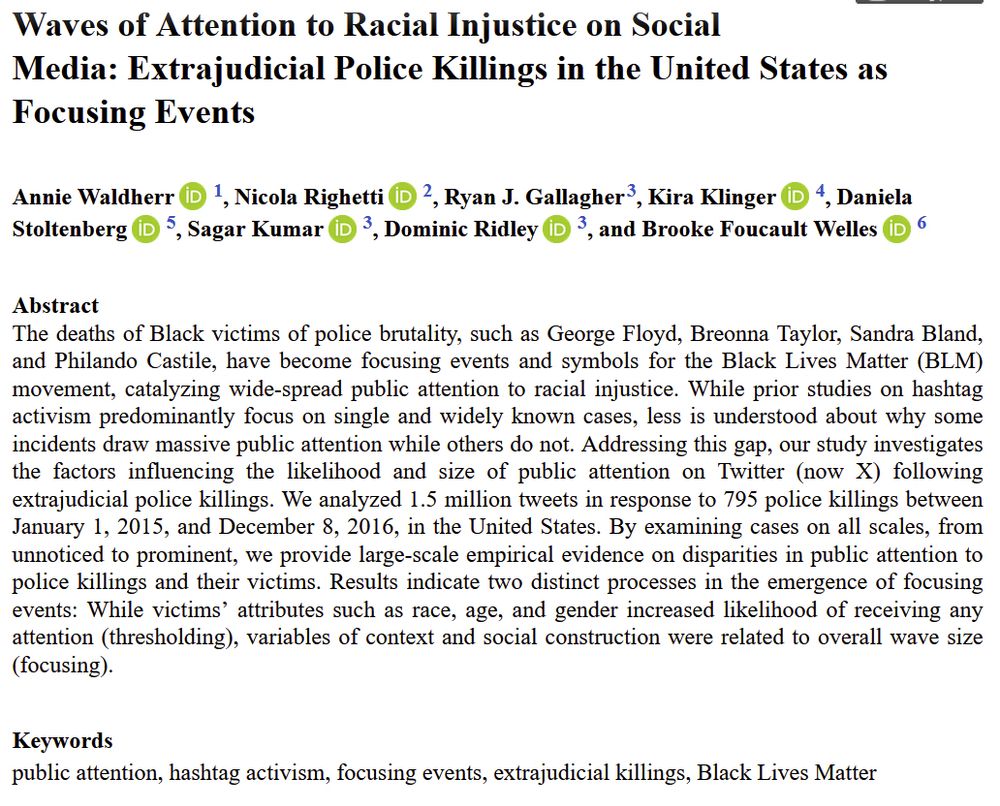Jula Luehring
@julaluehring.bsky.social
Computational communication scientist at the University of Vienna & Complexity Science Hub | alumna UvA ASCoR
https://julaluehring.github.io/
https://julaluehring.github.io/
Thanks to all my co-authors @dgarcia.eu @anniewald.bsky.social @janalasser.bsky.social @apeksha.bsky.social @hannahmetzler.bsky.social
Link to pre-print: doi.org/10.31234/osf...
Please let me know any thoughts and feedback on this!
Link to pre-print: doi.org/10.31234/osf...
Please let me know any thoughts and feedback on this!
November 11, 2025 at 9:59 AM
Thanks to all my co-authors @dgarcia.eu @anniewald.bsky.social @janalasser.bsky.social @apeksha.bsky.social @hannahmetzler.bsky.social
Link to pre-print: doi.org/10.31234/osf...
Please let me know any thoughts and feedback on this!
Link to pre-print: doi.org/10.31234/osf...
Please let me know any thoughts and feedback on this!
We contribute to misinfo research by
✅ using a comprehensive source-based approach (capturing the full spectrum, not just clear-cut fake news)
✅ applying a matching method to social media data... aka we measure misinfo effects on populations that are hard to reach otherwise!
✅ using a comprehensive source-based approach (capturing the full spectrum, not just clear-cut fake news)
✅ applying a matching method to social media data... aka we measure misinfo effects on populations that are hard to reach otherwise!
November 11, 2025 at 9:59 AM
We contribute to misinfo research by
✅ using a comprehensive source-based approach (capturing the full spectrum, not just clear-cut fake news)
✅ applying a matching method to social media data... aka we measure misinfo effects on populations that are hard to reach otherwise!
✅ using a comprehensive source-based approach (capturing the full spectrum, not just clear-cut fake news)
✅ applying a matching method to social media data... aka we measure misinfo effects on populations that are hard to reach otherwise!
So misinformation seems to leave distinct fingerprints on engagement and emotions, potentially creating a self-reinforcing cycle where angry users seek it out and amplify it through retweeting, which creates more self-selection through exposure (ie the motivated minority?)
November 11, 2025 at 9:59 AM
So misinformation seems to leave distinct fingerprints on engagement and emotions, potentially creating a self-reinforcing cycle where angry users seek it out and amplify it through retweeting, which creates more self-selection through exposure (ie the motivated minority?)
Higher anger is partially driven by self-selection. Users who engage with untrustworthy content show higher baseline anger.
Within the same user, disgust and fear increase with untrustworthy content, but anger doesn't change significantly.
Within the same user, disgust and fear increase with untrustworthy content, but anger doesn't change significantly.
November 11, 2025 at 9:59 AM
Higher anger is partially driven by self-selection. Users who engage with untrustworthy content show higher baseline anger.
Within the same user, disgust and fear increase with untrustworthy content, but anger doesn't change significantly.
Within the same user, disgust and fear increase with untrustworthy content, but anger doesn't change significantly.
2) Using ML to detect 7 distinct emotions in 11M replies, we found discussions following untrustworthy news show 9% more anger, 22% more disgust, and 12% less joy.
😡 Not all negative emotions matter equally: anger, disgust, and fear are key.
But...
😡 Not all negative emotions matter equally: anger, disgust, and fear are key.
But...
November 11, 2025 at 9:59 AM
2) Using ML to detect 7 distinct emotions in 11M replies, we found discussions following untrustworthy news show 9% more anger, 22% more disgust, and 12% less joy.
😡 Not all negative emotions matter equally: anger, disgust, and fear are key.
But...
😡 Not all negative emotions matter equally: anger, disgust, and fear are key.
But...
Key findings:
1) Despite being only 6% of shared news, untrustworthy sources get 39% more retweets and 12% more quote tweets, but 14% fewer likes and 19% fewer replies.
🤔 Untrustworthy news content, often containing misinfo, spreads differently than trustworthy news!
1) Despite being only 6% of shared news, untrustworthy sources get 39% more retweets and 12% more quote tweets, but 14% fewer likes and 19% fewer replies.
🤔 Untrustworthy news content, often containing misinfo, spreads differently than trustworthy news!
November 11, 2025 at 9:59 AM
Key findings:
1) Despite being only 6% of shared news, untrustworthy sources get 39% more retweets and 12% more quote tweets, but 14% fewer likes and 19% fewer replies.
🤔 Untrustworthy news content, often containing misinfo, spreads differently than trustworthy news!
1) Despite being only 6% of shared news, untrustworthy sources get 39% more retweets and 12% more quote tweets, but 14% fewer likes and 19% fewer replies.
🤔 Untrustworthy news content, often containing misinfo, spreads differently than trustworthy news!
Yaay congrats Jo, that's so exciting!! Hopefully see you soon over here then, come visit us in Vienna :)
August 22, 2025 at 11:28 AM
Yaay congrats Jo, that's so exciting!! Hopefully see you soon over here then, come visit us in Vienna :)
Reposted by Jula Luehring
Second, with a large team of authors, led by @anniewald.bsky.social, we study which (personal, temporal, spatial, affordance-based) properties of incidences of extrajudicial police killings facilitate public attention on social media.

August 1, 2025 at 9:26 AM
Second, with a large team of authors, led by @anniewald.bsky.social, we study which (personal, temporal, spatial, affordance-based) properties of incidences of extrajudicial police killings facilitate public attention on social media.
Reposted by Jula Luehring
The danger isn’t just that people believe lies. It’s that entire communities become locked into belief systems that can’t be challenged, where loyalty replaces evidence, and disagreement feels like betrayal. That doesn’t just distort truth, it breaks trust.
June 27, 2025 at 6:56 AM
The danger isn’t just that people believe lies. It’s that entire communities become locked into belief systems that can’t be challenged, where loyalty replaces evidence, and disagreement feels like betrayal. That doesn’t just distort truth, it breaks trust.
Juhuuu Glückwunsch und schöne Feier(n) dir!🎉
March 27, 2025 at 8:54 AM
Juhuuu Glückwunsch und schöne Feier(n) dir!🎉
Super cool, herzlichen Glückwunsch!!
March 3, 2025 at 9:18 AM
Super cool, herzlichen Glückwunsch!!

